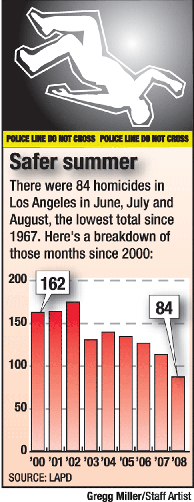
Homicides over the past three months in Los Angeles have fallen to their lowest levels since the Summer of Love more than 40 years ago despite a struggling economy that historically has meant more crime.
In the normally violent months of June, July and August, 84 people were killed citywide, including just seven in the San Fernando Valley. That makes this year the first time slayings have fallen below 100 for those three months since 1970, and the lowest number since 1967, when there were 79, according to LAPD figures released Tuesday.
It's a stark comparison with the peak of bloodshed in 1991, when gang wars raged and the city became known for its drive-by shootings. Or 2002, when L.A. was the homicide capital of the nation and there were 174 slayings during those three months.
Police Chief William Bratton attributed the recent drop to collaboration with other police agencies, an intense focus on gang crime and a crackdown on illegal immigrants with criminal records.
"Unemployment is up, the economy is not good. A lot of the things that so-called experts predict make crime go up is not happening here," he said. "We have been building momentum over the last six years. I think it will continue to get better."
Bratton, who started in 2002 and has overseen a six-year decrease in crime, said he expects to draw overall crime down 5 percent by the end of the year, but experts caution that at some point the reduction has to slow. The figures come more than a year after Mayor Antonio Villaraigosa and Bratton launched an aggressive anti-gang plan and the LAPD built ties with gang-intervention workers.
Under the plan, patrols increased in the most violent areas, the department created a list of the most wanted gang members and most dangerous gangs, and Villaraigosa carved out gang-reduction zones to focus on intervention and prevention.
A national trend?
Bratton has eased tensions between the FBI and the LAPD, and the department is now working smoothly with the federal agency on major crimes.
"I think it's smarter policing in terms of focusing in on the right problems, the right places and the right people," said George Tita, assistant professor of criminology, law and society at the University of California, Irvine.
"(But) I don't know how much lower they can go. It's going to take a continued focus and more innovative policing strategy in order to continue reductions."
But critics say the reduction merely mirrors crime trends among big cities.
"It may well be that Los Angeles is enjoying a much bigger reduction. But there are other reasons for such things to be happening," said Malcolm Klein, a criminologist and professor emeritus at the University of Southern California.
"To suggest homicides come down because we are (cracking down on gangs or illegal immigrants), it is really a stretch," he said. "It's a national trend, despite what our politicians tell us. At some point it has to bottom out."
Violent crimes down
As of Aug. 30, overall violent crime had fallen 5.4 percent this year, and gang-related homicides had dropped to 119, down from 163 during the same period last year. So far this year, 247 people have been killed citywide, 42 of them in the Valley.
"We are seeing our violence is less, our property crime is less, but to suggest there is a quiet on the street, I won't go that far," said Deputy Chief Michel Moore, head of the LAPD's operations in the Valley.
He cited a string of nighttime robberies along major thoroughfares that officers are trying to combat.
"We didn't get to this level of success with the status quo," Moore said. "We are seeing some outstanding results in violent-crime reduction, but we have to be vigilant."
In especially violent communities, that can mean a stronger - and sometimes tense - police presence.
"I don't feel that the statistics show what happens in the community," said Alex Sanchez, founder of Homies Unidos, a gang-intervention program in the Pico-Union area.
"There are some shootings that haven't even registered," he said, noting that a boy he knows was shot in the thigh but never went to the hospital.
The beefed-up patrols are shortsighted and push gang members into the shadows while failing to address the deeper issues that cause crime, he said.
"We have been seeing a drop (in crime), but it is not being sustained or maintained with resources," Sanchez said. "When you use suppression to reduce violence, you need to bring funds to help to get those kids help.











